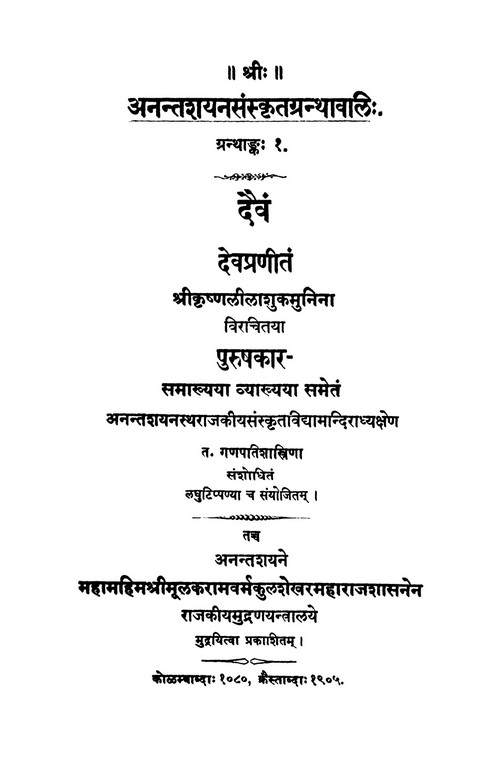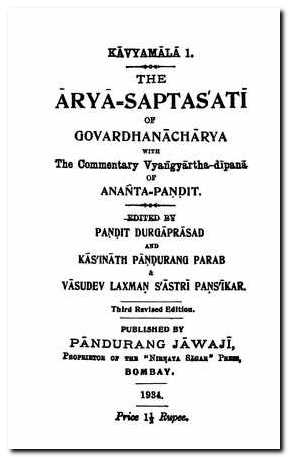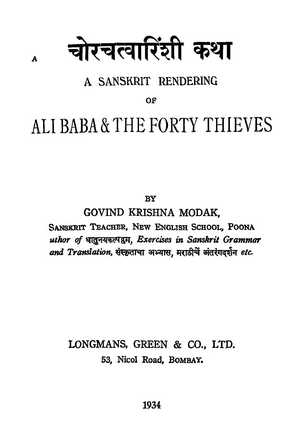 Trivandrum Sanskrit Series (Anantasayana Samskrita Granthavali) is a collection of ancient, very rare and previously unpublished Sanskrit works published by Manuscripts Library, Trivandrum in the early part of 20th century. First book in Trivandrum Sanskrit Series – “Daivam”, a work on Sanskrit grammar, was published in 1905 edited by MM T. Ganapati Sastri. Nearly 100 texts were published within a short span of 20 years and the series continues to this day.
Trivandrum Sanskrit Series (Anantasayana Samskrita Granthavali) is a collection of ancient, very rare and previously unpublished Sanskrit works published by Manuscripts Library, Trivandrum in the early part of 20th century. First book in Trivandrum Sanskrit Series – “Daivam”, a work on Sanskrit grammar, was published in 1905 edited by MM T. Ganapati Sastri. Nearly 100 texts were published within a short span of 20 years and the series continues to this day.
An article on Trivandrum Sanskrit Series written by G Harihara Sastri that appeared in Indian Historical Quarterly Volume 1 in 1925 describes the genesis and growth of this series and also evaluates the unique contributions of this series to the growth of Indological studies.
DOWNLOAD LINKS
TSS-001 Daivam (Vyakarana) by Deva with Purusakara of Krishnalilasuka muni
TSS-002 Abhinavakausthubamala and Dakshinamurtistava by Krishnalilasukamuni
TSS-003 Nalabhyudaya (Kavya) by Vamana Bhatta Bana
TSS-004 Sivaleelarnava (Kavya) by Nilakanta Dikshita
TSS-005 Vyaktiviveka (Alankara) by Mahima Bhatta with commentary
TSS-006 Durghatavritti (Vyakarana) by Saranadeva
TSS-007 Brahmatatvaprakasika of Sadasivendra Sarasvati
TSS-008 Pradyumnabhyudaya (Nataka) by Ravi Varma Bhupa
TSS-009 Virupakshapanchasika (Vedanta) with the commentary of Vidyacharya
TSS-010 Matangalila (Gajalakshana) by Nilakanatha
TSS-011 Tapathisamvaranam (Nataka)Kulasekharavarma with the commentary of Sivarama
TSS-012 Paramarthasaram (Vedanta) by Adisesa with the commentary of Raghavananda
TSS-013 Subhadradhananjayam (Nataka) by Kulasekhara Varma with the commentary of Sivarama
TSS-014 Nitisara (Niti) by Kamandaka with the commentary of Sankararaya
TSS-015 Svapnavasavadattam (Nataka ) by Bhasa
TSS-016 Pratijnayaugandharayanam (Nataka) of Bhasa
TSS-017 Pancharatram (nataka) by Bhasa
TSS-018 Narayaneeyam (Stuti) by Narayana Bhattathiri with the commentary of Dasamangalavarya
TSS-019 Manameyodaya (Mimamsa) by Narayana Pandita
TSS-020 Avimarakam (Nataka) Bhasa
TSS-021 Balacharitam (Nataka) Bhasa
TSS-022 Madhyamavyayoga Dutavakya Dutaghatotkacha karnabhara and Uirubhangam of Bhasa
TSS-023 Nanartharnavasamshepa Kesavasvamin Part 1
TSS-024 Janakiparinaya (Kavya)by chakrakavi
TSS-025 Kanadasidhantha Chandrika (Nyaya) by Gangadhara Suri (NEW)
TSS-026 Abhisekanatakam by Bhasa
TSS-027 Kumarasambhava with the two commentaries Prakasika of Arunagirinatha and Vivarana of Narayana Pandita Part 1
TSS-028 Vaikhanasadharmaprasna (Dharmasutra) by Vikhanas
TSS-029 Nanarthanavasamshepa (Kosa) by Kesavasvamin Part 2
TSS-030 Vastuvidya (silpa) (NEW)
TSS-031 Nanartharnavasamshepa of Kesavasvamin Part 3
TSS-032 Kumarasambhava (Kavya ) o+B169f Kalidasa with the two commentaries Part 2
TSS-033 Vararuchasangraha (Vyakarana) with the commentary of Dipaprabha of Narayana
TSS-034 Manidarpana (Nyaya) Rajachudamanimakhin
TSS-035 Manisara (Nyaya)of Gopinatha (NEW)
TSS-036 Kumarasambhava (Kavya) of Kalidasa with the two commentaries Part 3
TSS-037 Asouchashtakam (Smriti) by vararuchi with commentary
TSS-038 Namalinganusasanam (Kosa) by amarasimha with the commentary Tikasarvasva of Vandyaghatiya Sarvananda Part 1
TSS-039 Charudatham (Nataka ) Bhasa
TSS-040 Alankarasutram of Rajanaka Ruyyaka with the Alankarasarvasa of Mankhuka and its commentary by Smudrabandhin
TSS-041 Adhyatmapatalam (Vedanta) by Apasthamba with the vivarana of Sri Sankara Bhagavad Pada
TSS-042 Pratimanatakam of Bhasa
TSS-043 Namalinganusasanam (Kosa) by Amarasimha with Tikasarvasva of Vandyaghatiya Sarvananda Part 2
TSS-044 Tantrasuddham by Bhattaraka Vedottama (NEW)
TSS-045 Prapanchahridayam (NEW)
TSS-046 Paribhashavritti (Vyakarana) Nilakanta Diskhita (not found)
TSS-047 Sidhanthasidhanjanam (Vedanta) Krishnananda Sarasvati Part 1
TSS-048 Sidhanthasidhanjanam (Vedanta) Krishnananda Sarasvati Part 2
TSS-049 Goladeepika (Jyotisha) by Paramesvara (NEW)
TSS-050 Rasarnavasudhakara (Alankara) by Singha Bhupala
TSS-051 Namalinganusasanam Part 3
TSS-052 Namalinganusasanam Part 4
TSS-053 Sabdanirnaya (Vedanta) Prakasamatyatindra
TSS-054 Sphotasidhinyayavichara (Vyakarana) (NEW)
TSS-055 Mattavilasaprahasana (Nataka) Mahendravikramavarman (NEW)
TSS-056 Manushyalayachandrika (Silpa) (NEW)
TSS-057 Raghuviracharitham (Kavya)
TSS-058 Sidhanthasidhanjanam (Vedanta) Krishnananda Sarasvati Part 3
TSS-059 Naganandam (Nataka) by Harsadeva with the commentary Vimarsini of Sivarama
TSS-060 Laghusthuti by Laghubhattaraka with the commentary of Raghavananda (NEW)
TSS-061 Sidhanthasidhanjanam (Vedanta) Krishnananda Sarasvati Part 4
TSS-062 Sarvamata sangraha
TSS-063 Kiraturjiniya of Bharavi with the commentary of Sabdarthadipika of Chitrabhanu
TSS-064 Meghasandesa of Kalidasa commentary pradipa of Dakshinavartanatha
TSS-065 Mayamatam (silpa)of Mayamuni
TSS-066 Maharthamanjari with the commentary of Parimala of Mahesvarananda 1919 (NEW)
TSS-067 Tantrasamuchaya (Tantra) of Narayana with the commentary of Vimarsini of Sankara Part 1 (1-6 patalas)
TSS-068 Tatwaprakasa (Agama)by Sri Bhojadeva with the commentary Tatparyadipika of Srikumara
TSS-069 Isanagurudevapadhathi (Tantra) by Isaanasivagurudevamisra Part 1 Samanyapada
TSS-070 Aryamanjusrimulakalpa Part 1
TSS-071 Tantrasamuchaya (tantra) byNarayana with the commentary Vimarsini of Sankara Part 2 (7-12 patala)
TSS-072 Isanagurudevapadhathi (Tantra) by Isanasivaguridevamisra Part 2 mantrapada
TSS-073 Isvarapratipattiprakasa (Vedanta) madhusudanandasarasvati (NEW)
TSS-074 Yajnavalkyasmriti with the commentary Balakrida of Visvarupacarya Part 1 (NEW)
TSS-075 Silparatnam (silpa) by Srikumara Part 1
TSS-076 Aryamanjusrimulakalpa Part 2
TSS-077 Isanasivagurudevapadhathi (agama) Part 3
TSS-078 Asvalyanagrihyasutram with the commentary of Haradattacharya
TSS-079 Arthasastran of kautilya with commentary by Mahamahopadhyaya Ganapathi sastri Part 1
TSS-080 Arthasastram of Kautilya Part 2
TSS-081 Yanjnavalkyasmriti with the commentary of Balakrida of Visvarupacarya Part 2
TSS-082 Arthasastram of Kautilya Part 3
TSS-083 Isanasivagurudevapadhathi (Agama) by Isanasivagurudevamisra Part 4
TSS-084 Aryamanjusrimulakalpa Part 3
TSS-085 Vishnusamhita (Agama)
TSS-086 Bharathacharitam of Srikrishnakavi (Kavya) (NEW)
TSS-087 Sangitasamayasara (sangita) of Parsvadeva
TSS-088 Kavyaprakasa (Alankara) of Mammatabhatta with the two commentaries the Sampradayaprakasini of Sri Vidyachakravartin and the Sahityacudamani of Bhattagopala Part 1
TSS-089 Sphotasiddhi (Vyakarana) of Bharatamisra 1927 (NEW)
TSS-090 Mimamsaslokavartikam Part 1 with the commentary of Kasika of Sucaritamisra
TSS-091 Horasastram of Varahamihiracarya with the vivarana of rudra
TSS-092 Rasopanishat
TSS-093 Vedantaparibhasha with the commentary Prakasika of Peddadikshita (NEW)
TSS-094 Brihaddesi (Sangita) of Matangamuni (NEW)
TSS-095 Ranadipika (Jyotisa) of Kumaraganaka
TSS-096 Rksamhita (with the Bhashya of skandasvamin and the commentary of Venkatamadhavaraya (Part 1)
TSS-097 Naradiyamanusamhita (smriti) with the bhasya of Bhavasvamin
TSS-098 Silparatnam (silpa) Sri kumara Part 2
TSS-099 Mimamsaslokavartikam Part 2
TSS-100 Kavyaprakasa (Alankara) of Mammatabhatta Part 2 (NEW)
TSS-101 Aryabhatiyam (Jyotisha) of Aryabhatacarya with the Bhashya of Nilakantasomasutvan (Part 1 Ganitapada)
TSS-102 Dattilam (Sangita) of Dattilamuni (NEW)
TSS-103 Hamsasandesa with Commentary (Kavya) (Vedanta)
TSS-104 Sambapancasika (Stuti) with commentary
TSS-105 Nidhipradipa of Sidha Srikanthasambhu
TSS-106 Prakriyasarvasva (Vyakarana) of Sri Narayanana Bhatta with the commentary Part 1
TSS-107 Kavyaratna (Kavya) of Arhaddasa
TSS-108 Balamartandavijayam (Nataka) of Devarajakavi
TSS-109 Nyayasara with the commentary of Vasudevasuri
TSS-110 Aryabhatiyam (Jyotish) of Aryabhatacarya wth Bhashya of Nilakanthasomasutvan Part 2
TSS-111 Hridayapriya (Vaidyaka) by parameswara
DOWNLOAD TORRENT OF COMPLETE SET OF “TRIVANDRUM SANSKRIT SERIES”
Tags: agama, alankara, Anantasayana Samskrita Granthavali, ganapati sastri, mimamsa, niti, nyaya, sambasiva sastri, sanskrit kavya, sanskrit nataka, silpasastra, t ganapati shastry, tantra, Trivandrum Sanskrit Series, vastu, vedanta







